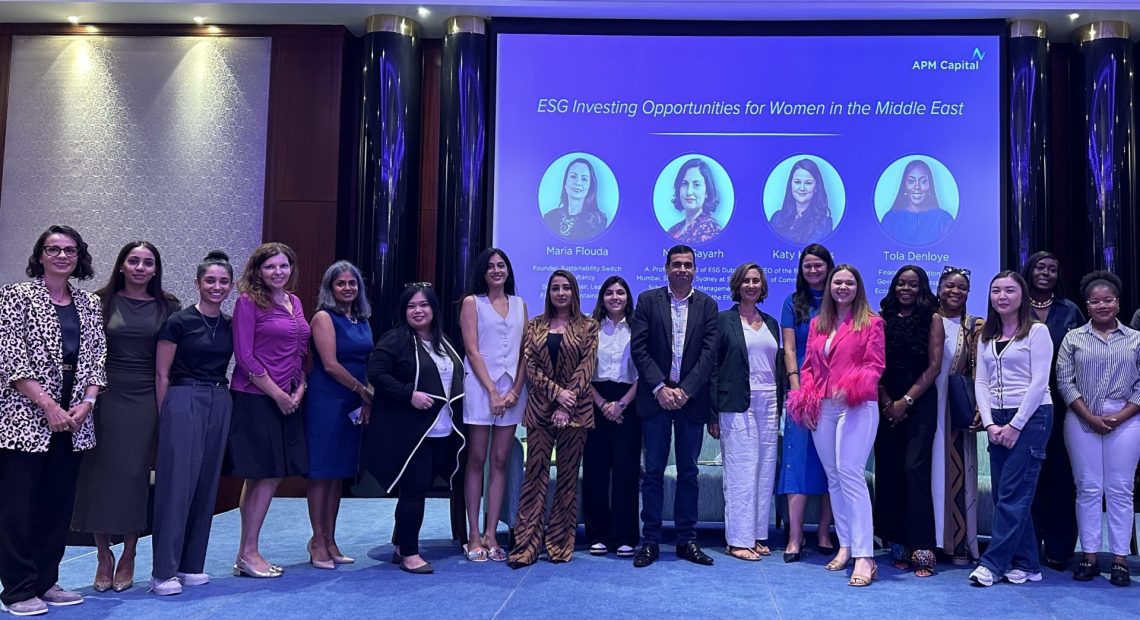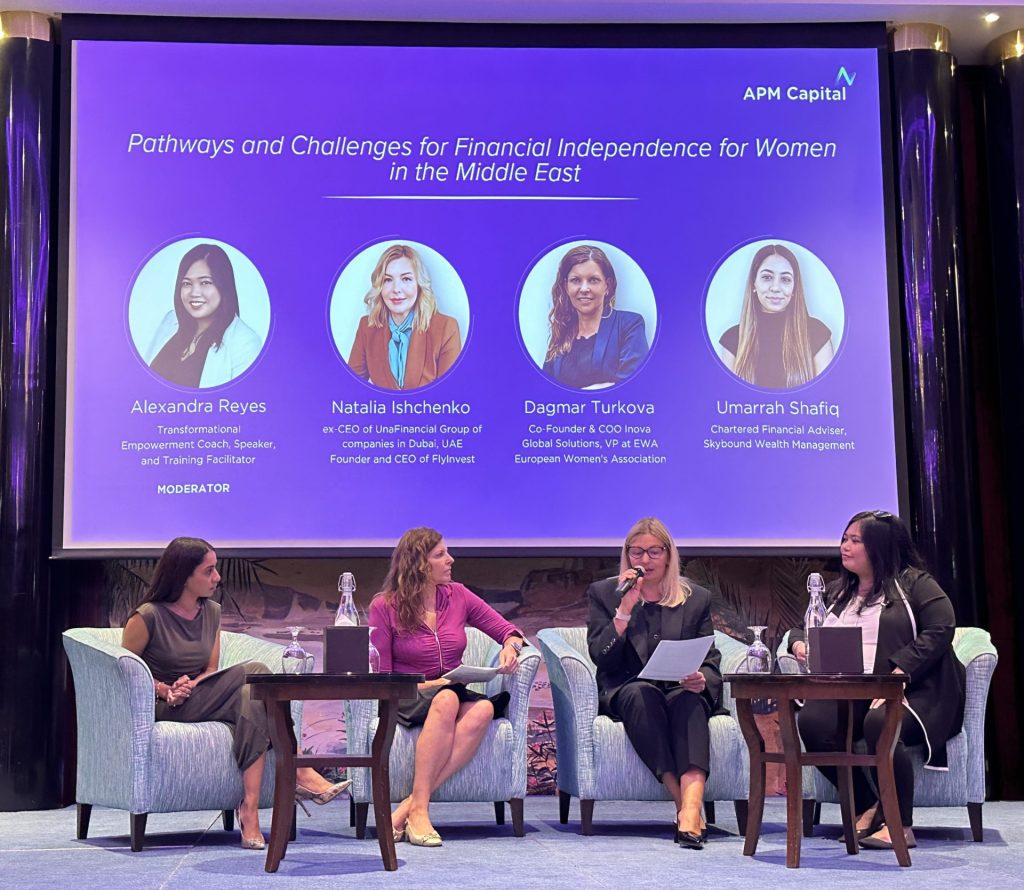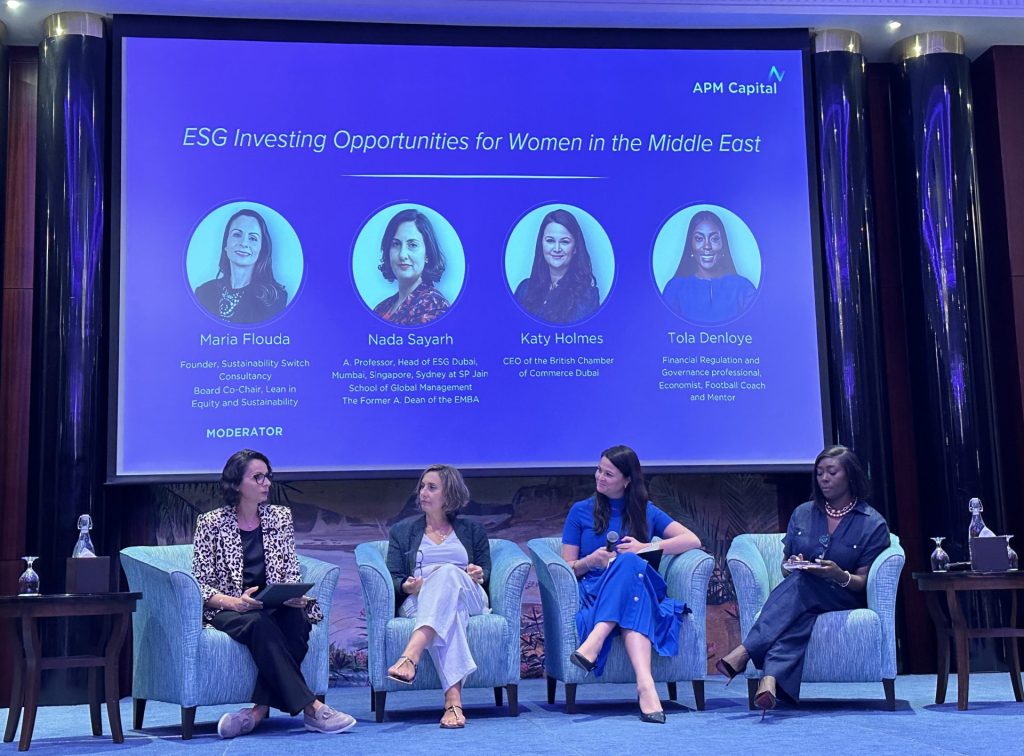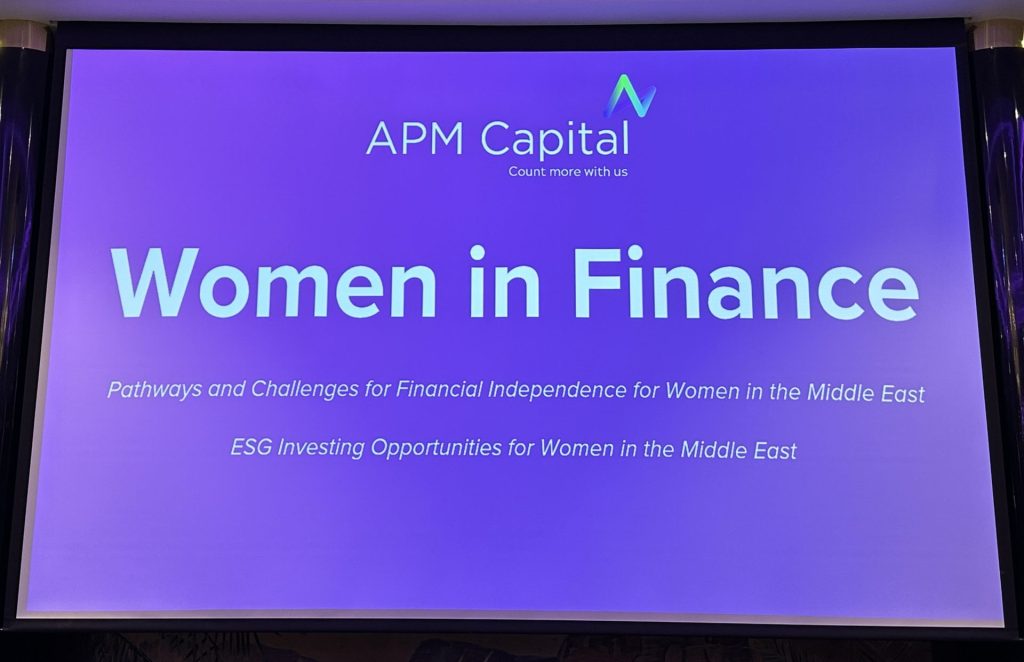Dubai panel: Financially empowered future is key for women

Financial literacy and independence seen vital
A distinguished all-women panel gathered in Dubai, United Arab Emirates, on August 26, 2024, to discuss critical issues surrounding financial literacy and empowerment for women in the Middle East.
Organised by APM Capital Limited, a leading financial brokerage company based in Abu Dhabi, the event’s panellists featured experts from academia, the financial sector, and sustainability advocacy, who delved into various aspects of ESG integration, educational outreach and the challenges women face in leadership roles.
APM Capital hosted the day-long event titled ‘Women in Finance’ to commemorate Emirati Women’s Day 2024, celebrated on August 28 across the UAE. The event’s timing, just two days before this significant day, underscored the urgency of the issues.
The event, at which Disha Rajdev, Executive Director of APM Capital, delivered the opening remarks, highlights the growing momentum in addressing financial literacy and independence for women in the Middle East, with a shared commitment to overcoming barriers and fostering a more inclusive economic landscape.
The discussion also touched on the importance of women’s networks and personal development. The panel highlighted the value of networking for advancing careers and exploring new opportunities, emphasising that both men and women should be aware of their organisations’ gender diversity statistics.
Watch the video here:
‘Pathways and Challenges for Financial Independence for Women in the Middle East’
The first panel discussion, ‘Pathways and Challenges for Financial Independence for Women in the Middle East,’ was moderated by Alexandra Reyes, a transformational empowerment coach, speaker, and training facilitator.
The panel featured a diverse range of experts, each bringing a unique perspective: Dagmar Turkova, Co-Founder and COO of Inova Global Solutions and Vice President at the European Women’s Association; Natalia Ishchenko, ex-CEO of Una Financial Group and Founder and CEO of FlyInvest; and Umarrah Shafiq, a chartered financial advisor at Skybound Wealth Management in Dubai.
Significant gap
This panel discussion took place against the background of only 30% of women in the Middle East having basic financial knowledge, highlighting a significant gap in financial literacy that needs to be addressed.
According to the panellists, initiatives to improve financial education could be crucial in empowering women and enhancing their economic opportunities in the Middle East. Additionally, cultural norms and legal frameworks, such as Sharia-based laws, can significantly influence women’s financial independence and career growth, often imposing constraints that limit their economic potential.

The panellists also noted that despite women-owned businesses constituting 30% of SMEs in the Middle East, they receive only 7% of SME funding, revealing a substantial disparity in financial support. To address this situation, the panellists agreed that microfinance and mentorship programmes could be pivotal in fostering the growth of women-owned enterprises.
Furthermore, the panellists stated that coordinated efforts involving government agencies, the private sector, and non-profits are essential for driving legal reforms and advocacy, supporting greater financial independence for women in the region.
Current state
Natalia Ischenko provided insights into the current state of financial literacy among women in the region. “Financial literacy in the MENA region is rising to the global average. Recent data shows that financial literacy is approximately 38%, slightly above the global average. However, women’s financial literacy is generally lower than men’s by 5 to 10 percentage points.”
Ischenko attributed this gap to cultural and social norms restricting women’s access to financial services and practical experience. Despite these challenges, she praised the UAE’s progress, highlighting that around 80% of women in the UAE have access to banking services, a rate higher than the regional average.
Facing barriers
Dagmar Turkova discussed the barriers women face in financial education and business. While women’s understanding of essential financial matters has improved, there remains a significant gap in more complex areas such as investment readiness and business management.
“Recent studies show that 54% of women lack confidence in their investment knowledge, with only 7.5% rating it highly. This gap underscores the urgent need for enhanced education and support,” said Turkova.
Turkova also highlighted the role of cultural norms and limited access to financial networks as barriers to women’s financial progress. She stressed the importance of targeted financial literacy programmes, which are beneficial and necessary for women to access business and economic networks better.
Several obstacles
Umarrah Shafiq addressed the cultural and legal obstacles to financial independence for women in the Middle East. She noted that traditional gender roles often limit women’s involvement in economic matters, impacting their career and entrepreneurial opportunities. She advocated for more flexible working conditions, better parental leave policies, and increased access to capital for female entrepreneurs.
Shafiq also pointed to small business ownership’s success in financially empowering women. “Owning a business gives women control over their income and work conditions. It also provides valuable networking opportunities and contributes significantly to the local economy,” she said. Despite these benefits, she highlighted that women-owned businesses account for only about 20% of the UAE’s GDP, with room for growth compared to the global average.
The panel concluded by discussing practical strategies for overcoming financial, cultural, and legal obstacles. Ischenko and Turkova emphasised the importance of networking, mentorship, and targeted financial education programs. Shafiq urged more women in leadership roles and accessible support systems to guide the next generation of female entrepreneurs.
In closing the first-panel discussion, Reyes encouraged attendees to leverage shared insights and make valuable connections during the event. “Today’s discussion is just the beginning. Let us continue to support each other and work towards a more financially empowered future for women in the Middle East.”
‘ESG Investing Opportunities for Women in the Middle East’
Maria Flouda, Founder & Managing Consultant at Sustainability Switch Consultancy, moderated the second panel discussion, ‘ESG Investing Opportunities for Women in the Middle East.’
This panel comprised Tola Denloye, Head of Compliance and MLRO at AMD Capital; Nada Sayarh, Marketing and Strategy Professor and head of ESG at SP Jain School of Global Management (Dubai, Mumbai, Singapore, Sydney); and Katy Holmes, CEO at the British Chamber of Commerce Dubai.

The second-panel discussion centred on women’s growing interest in ESG (Environmental, Social, and Governance) investing, especially as women across the Middle East seek to align their investment portfolios with their values and drive positive change.
Rising interest
The panellists said this rising interest allows women to leverage their investments for financial returns and support causes they care about, such as environmental sustainability and social equity.
The panellists also noted that ESG investments raise questions about their potential to deliver competitive returns while addressing environmental and social risks. Investors are increasingly examining whether these investments can achieve strong financial performance while contributing to sustainable and ethical practices.
However, women face several barriers to ESG investing, including limited representation in leadership roles within the investment sector and a lack of financial products tailored to their needs. The panellists stressed that these obstacles could hinder their ability to engage in and benefit from ESG investment opportunities fully.
As more women in the Middle East become involved in ESG investing, their participation will shape the future of sustainable investment products and practices. The panellists concurred that this shift could lead to more innovative and inclusive investment solutions, further promoting sustainability and social responsibility within the financial sector.
ESG efforts boost
Katy Holmes said the British Chamber of Commerce Dubai, a pivotal membership organisation, has significantly expanded its ESG efforts, moving beyond mere compliance to foster genuine impact and education.
“ESG is no longer a tick-box exercise for us. With the upcoming COP 29, we have embraced ESG as a core component of our mission. We have launched the BCD Green Core initiative, which showcases exemplary practices and aims to inspire our members by making ESG more accessible,” Holmes added.

“The Green Core initiative includes activities designed to demystify ESG for businesses, focusing on practical examples and case studies. One notable success involves a female-led company that reduced carbon emissions by shifting manufacturing to the UAE. Such examples aim to guide companies through the complexities of implementing sustainable practices,” said Holmes.
Making strides
Nada Sayarh said that universities are making strides in embedding ESG principles into their curricula in the academic sphere. “We [SP Jain School of Global Management] have integrated ESG across all academic programmes, believing it should be a fundamental aspect of every business education,” said Sayarh.
She added that SP Jain School of Global Management has also engaged with local industries to provide practical insights and case studies, addressing the gap in understanding how to apply ESG concepts effectively.
The university’s efforts include offering executive education courses and scholarships for women returning to the workforce after maternity leave. These initiatives aim to bolster female representation in leadership roles and support broader diversity in the finance and business sectors.
Gaining traction
The conversation around ESG is gaining traction in the finance industry, though challenges remain. Tola Denloye emphasised the need for more equitable practices and excellent female representation in leadership roles. Despite progress in some areas, such as increased female leadership at specific firms, systemic barriers and cultural differences still pose obstacles.
“We need to address these cultural and structural challenges to realise ESG’s potential fully,” Denloye noted. “It’s crucial for financial institutions to recognise these issues and work towards more inclusive practices.”
A vital topic of the second-panel discussion was the role of artificial intelligence (AI) in enhancing ESG reporting and transparency. Panellists discussed how AI could bridge data gaps, particularly in regions with insufficient information, and improve the accuracy and efficiency of ESG reporting. Speakers emphasised the need for transparency and encouraged companies to leverage AI tools to automate and enhance their ESG reporting processes.
Featured image: APM Capital representatives, panellists and audience members at the Women in Finance event in Dubai on August 26, 2024. Credit: Arnold Pinto













